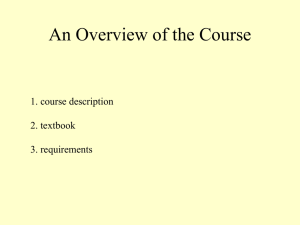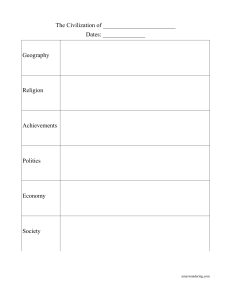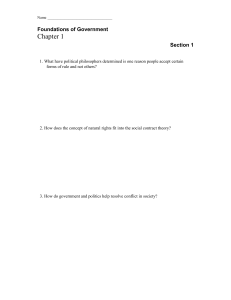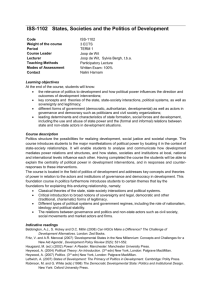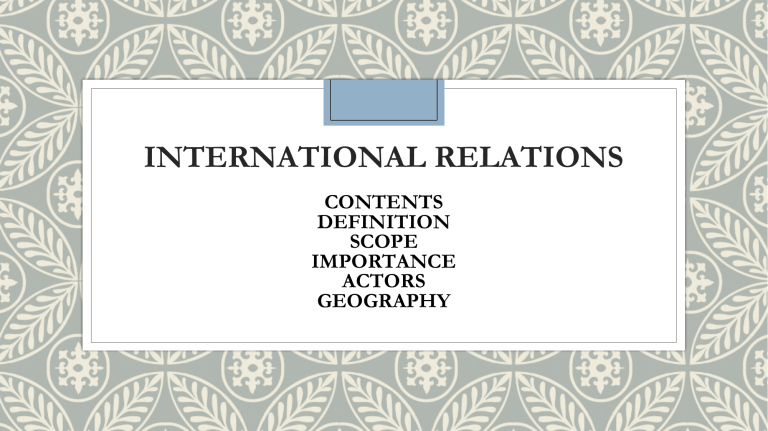
INTERNATIONAL RELATIONS CONTENTS DEFINITION SCOPE IMPORTANCE ACTORS GEOGRAPHY CONTENTS ◦ Historical Context of Contemporary International System ◦ Major Theories Of International Relations ◦ The International System ◦ The State ◦ Diplomacy ◦ Collective Security ◦ Disarmament ◦ International Law Globalizing Issues ◦ Terrorism ◦ Human Rights ◦ The Environmental degradation ◦ Population Issues and natural resource depletion ◦ China-US bilateral relations ◦ Islamophobia: Causes, instances and way forward ◦ Kashmir issue ◦ Palestine issue ◦ Russia-Ukraine issue ◦ Muslim genocide in India Books ▪ Andrew Heyood, Global Politics, Palgrave Macmillan foundation ▪ Richard W. Mansbach And Kirsten L. Rafferty, Introduction to Global Politics, Routledge NeYork ▪ Steve Smith, John Baylis and Patricia Owens, The Globalization of World Politics. ▪ Joseph S. Nye, Jr., Understanding International Conflicts: An Introduction to Theory and History ▪ Scott Burchill, Theories of International Relations. 3rd Edition. ▪ Charles W. Kegley, Jr. World Politics: Trends and Transformation. Eleventh Edition. ▪ Mingst, Karen. Essentials of International Relations. New York: W.W. Norton & Company, Inc, 2008.(Core Book) ▪ Goldstein, Joshua. International Relation; Washington DC: Pearson Tenth Education, 2013-2014. ◦ The term ‘International’ was used for the first time by Jermey Bentham (1748 –1832, The Principles of Morals and Legislation) in the later part of the 18th century. ◦ International relations refers to the collective interactions of the international community, which includes individual nations and states, inter-governmental organizations such as the United Nations and other non-governmental organizations. ◦ IR is not confined with one field such that only politics among nations it includes other social structures e.g. economic, culture, and domestic politics. Therefore, IR is a large subject that overlaps several other fields. ◦ International relations (IR) is the study of relationships between countries, including the roles of States, Inter- governmental Organization (IGOs), International Non- governmental Organization (INGOs), Non-governmental Organization (NGOs) and Multinational Corporations (MNCs). Scope ◦ The scope of IR should include study of "varied types of groups-nations, states, governments, peoples, regions, alliances, confederations, international organizations, even industrial organizations, cultural organizations, religious organization" etc. which are involved in the conduct of these relations. ◦ Professor Alfred Zimmern had written before the Second World War that : "International Relations . . . . . is clearly not a subject in the ordinary sense of the word. It does not provide a single coherent body of teaching material . . .. . It is not a single subject but a bundle of subjects . . . . . of law, economics, political science, geography, and so on . . . . . " UTILITY OF THE STUDY OF IR ◦ No country in the World can live in isolation. ◦ We are today living in an interdependent state - system. It is essential for all of us to have a clear idea of what is happening in the world. Political events are important, but even economic developments, trade, commerce and activities of actors like multinational corporations are no less significant. ◦ We live in an age of growing international cooperation. Therefore, not only do the activities of the United Nations and its numerous agencies affect all the nations and their peoples, but regional organizations like the European Union, South Asian Association of Regional Cooperation (SAARC), Association of South East Asian Nations (ASEAN) and the ' Organization of African Unity (OAU) also play important roles in our lives. ◦ International terrorism has been a concern for the humankind and economic institutions like the World Bank and the World Trade Organization (WTO) affect international relations. The study of International Relations has therefore become highly useful and enlightening for students and others alike. ◦ The 20 century witnessed two world war which was very dangerous in their destruction of man and material. It is feared that a third world war would wipe out the human race on earth if it comes. ◦ The study of IR helps us to analyze and aims of the states in the world affairs, the methods adopted for that attainment of these objects and the factors which ultimately lead to their success or failure. ◦ The international understanding helps us to analyze ways adopted by all the states to live boldly and confidently in the world of diversity with peacefully. ◦ Today the modern weapons of warfare have became very sophisticated and too much danger in a matter of few hours they can wipe out millions of population by their atom bombs, germ warfare etc. ◦ Environmental degradation and climate change is another perspective in recent years that is altogether changing the course of history. ◦ It warns about the threat to the world peace and need to have precautionary measure. To educate the people in the interest of the very survival of human race. ◦ The study of the IR aims at better understanding of problems of the world. Any states which violate international peace should be silenced by collective actions of all the states. ◦ It avoids international conflicts and ensures international peace – It helps to understand the true importance of collective security and disagreement. These all are making way for the new concept of Global village or ―World Community. Actors of International Relations STATE According to 1933 Montevideo Convention on the Rights and Duties of States, a state is composed of ◦ a defined territory demarcated by specific boundaries ◦ a defined population residing in that territory ◦ an integrated set of institutions that is capable of making and enforcing laws over this population (internal sovereignty) ◦ the recognition by other states of the sovereignty of that state (external sovereignty). State-centrism: An approach to political analysis that takes the state to be the key actor in the domestic realm and on the world stage. Since the 1970s, indeed, pluralist theorists have advocated a mixed-actor model of world politics. However, although it is widely accepted that states and national governments are merely one category of actor amongst many on the world stage, they may still remain the most important actors. No TNC or NGOs, for instance, can rival the state’s coercive power, either its capacity to enforce order within its borders or its ability to deal militarily with other states. NON STATE ACTORS Actors that ◦ share some but not all of the characteristics of states (sub-state actors) ◦ incorporate two or more states in a new entity (e.g. international organizations) Non state Actors can be categorized on: ◦ International Organizations ◦ Multinational Corporations ◦ Non-governmental Organizations ◦ Institutions with formal membership and procedures, only states are members, membership can be limited or universal and purpose may be broad or narrow. Examples of IO’s ◦ Limited Membership, Narrow Purpose:- Organization of Petroleum Exporting Countries ◦ Limited Membership, Broad Purpose :-African Union ◦ Universal Membership, Narrow Purpose:- Universal Postal Union ◦ Universal Membership, Broad Purpose:- United Nations ◦ MNCs are organizations that seek to make a profit by engaging in foreign production, marketing, finance, and staffing through directly controlled affiliates located in several states. Examples of MNCs ◦ Coca-Cola, Sony, Nike, Mac Donalds ◦ Broad category - Not states and non- profit. Includes religions, charities, political activists, academic research communities, and even terrorist groups. Examples of NGOs International Red Cross. ASIA EUROPE AFRICA NORTH AMERICA SOUTH AMERICA CENTRAL AMERICA OCEANIA INTRODUCTION TO GLOBAL POLITICS (RICHARD W. MANSBACH-KIRSTEN L. RAFFERTY) ◦ THREATS AND OPPORTUNITIES (PG : 1-11) ◦ THE EVOLUTION OF THE INTERSTATE SYSTEM AND ALTERNATIVE POLITICAL SYSTEMS (PG : 55-79) THE GLOBALIZATION OF WORLD POLITICS- AN INTRODUCTION TO INTERNATIONAL RELATIONS (JOHN BAYLIS STEVE SMITH PATRICIA OWENS) ◦ LIST OF CASE STUDIES (PG: xxiii) ◦ INTRODUCTION (PG : 1-09)

